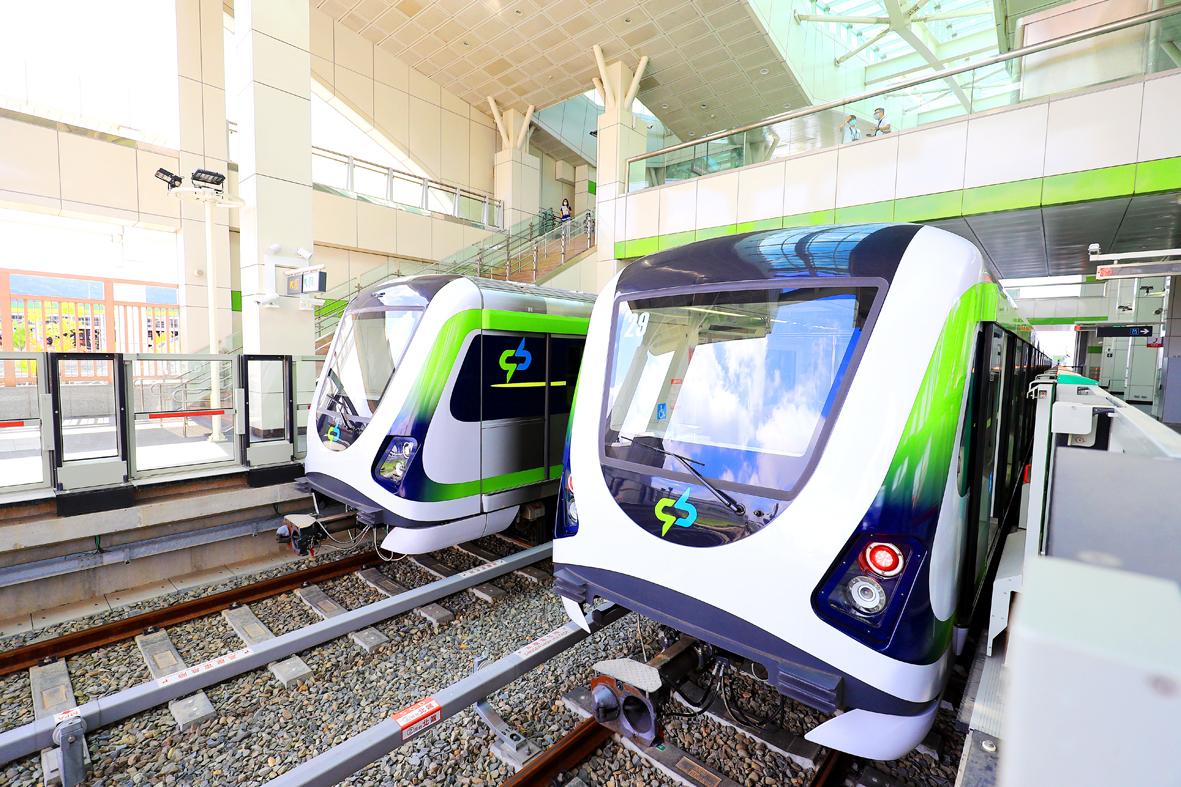The first line of Taichung’s Mass Rapid Transit (MRT) system could start trial runs within a week, allowing people to travel for free, the Taichung City Government said on Friday, after it received final operational approval from the Ministry of Transportation and Communications.
The trains would in the first three weeks of trials operate daily from 7am to 8pm, and from 6am to midnight in the fourth and last week of trials, Taichung Mass Rapid Transit Co said.
The trains would run every five minutes during peak hours, every eight minutes during off-peak hours on weekdays and every eight minutes throughout weekends and holidays, it added.

Photo: Su Chin-feng, Taipei Times
The MRT Taichung Green Line has 18 stations and is scheduled to start commercial operations by the end of this year, after 11 years of construction, the city government said.
The 16.7km line is expected to improve connections between major transportation hubs in the city, such as the Taichung High Speed Railway Station and two Taiwan Railways Administration (TRA) stations — Songzhu and Daqing — as well as Taichung City Hall.
It connects the city’s Beitun (北屯), Situn (西屯), Nantun (南屯) and Wuri (烏日) districts and is the first of an MRT network that is projected to include four lines.
Feasibility studies are underway for the east-to-west Blue Line, which is projected to intersect with the Green Line and connect the Taichung Port and Taichung Railway Station, and would be operational in a second MRT development stage, the company said.
Taichung Mayor Lu Shiow-yen (盧秀燕) said that the lowest ticket price would be NT$20, with fares increasing by NT$5 after every 2km traveled.
The project was initiated in 1998, and construction started in 2009 during the tenure of former Taichung mayor Jason Hu (胡志強), who was succeeded by Minister of Transportation and Communications Lin Chia-lung (林佳龍), who held the mayoral office from 2014 to 2018.
Costs for the Green Line totaled NT$59.3 billion (US$2.05 billion), with NT$32.8 billion funded by the central government.
Integrated public transportation development is vital for the success of the Taichung MRT, said Lee Ker-tsung (李克聰), a transportation expert at the Consumers’ Foundation, adding that the city’s public transportation system has in the past few years faced a lot of criticism.
Public bike rentals and bus services should also be expanded, he said.
“People should become familiar with traveling by more than one means of public transportation,” Lee said.
However, incentives in place in Taichung, such as steep discounts, including free rides, are not sustainable, he said.
In other news, Taichung is to ban chain beverage shops from using polystyrene cups, becoming the nation’s second city to do so after Tainan.
Non-compliance with the Autonomous Regulations of Low-carbon City Development in Taichung City (臺中市發展低碳城市自治條例), which are to be imposed next year, would result in a verbal warning in the first instance, and fines from NT$1,200 to NT$6,000 for further contraventions.
After Tainan banned polystyrene containers in 2013, the Taichung government in June also reached a consensus with beverage chains that operate in the city, the Taichung Environmental Protection Bureau said.
The rule would apply to 2,851 shops, bureau Acting Director-General Chen Hung-yi (陳宏益) said.
The bureau would also help shops put in place incentives for customers to bring their own containers, Chen said.
Additional reporting by Tsai Shu-yuan

The Grand Hotel Taipei on Saturday confirmed that its information system had been illegally accessed and expressed its deepest apologies for the concern it has caused its customers, adding that the issue is being investigated by the Ministry of Justice Investigation Bureau. The hotel said that on Tuesday last week, it had discovered an external illegal intrusion into its information system. An initial digital forensic investigation confirmed that parts of the system had been accessed, it said, adding that the possibility that some customer data were stolen and leaked could not be ruled out. The actual scope and content of the affected data

DO THEY BITE IT? Cats have better memories than people might think, but their motivation is based entirely around the chance of getting fed Cats can remember the identity of the people who fed them the day before, Taipei-based veterinarians said on Friday, debunking a popular myth that cats have a short memory. If a stray does not recognize the person who fed them the previous day, it is likely because they are not carrying food and the cat has no reason to recognize them, said Wu Chou Animal Hospital head Chen Chen-huan (陳震寰). “When cats come to a human bearing food, it is coming for the food, not the person,” he said. “The food is the key.” Since the cat’s attention is on the food, it

A New York-based NGO has launched a global initiative to rename the nation’s overseas missions, most of which operate under the name "Taipei," to "Taiwan Representative Office (TRO)," according to a news release. Ming Chiang (江明信), CEO of Hello Taiwan, announced the campaign at a news conference in Berlin on Monday, coinciding with the World Forum held from Monday through Wednesday, the institution stated in the release. Speaking at the event, Democratic Progressive Party Legislator Huang Jie (黃捷) said she believed this renaming campaign would enable the international community to see Taiwan

TOO DANGEROUS: The families agreed to suspend crewed recovery efforts that could put rescuers in danger from volcanic gases and unstable terrain The bodies of two Taiwanese tourists and a Japanese pilot have been located inside a volcanic crater, Japanese authorities said yesterday, nearly a month after a sightseeing helicopter crashed during a flight over southwestern Japan. Drone footage taken at the site showed three bodies near the wreckage of the aircraft inside a crater on Mount Aso in Kumamoto Prefecture, police and fire officials said. The helicopter went missing on Jan. 20 and was later found on a steep slope inside the Nakadake No. 1 Crater, about 50m below the rim. Authorities said that conditions at the site made survival highly unlikely, and ruled